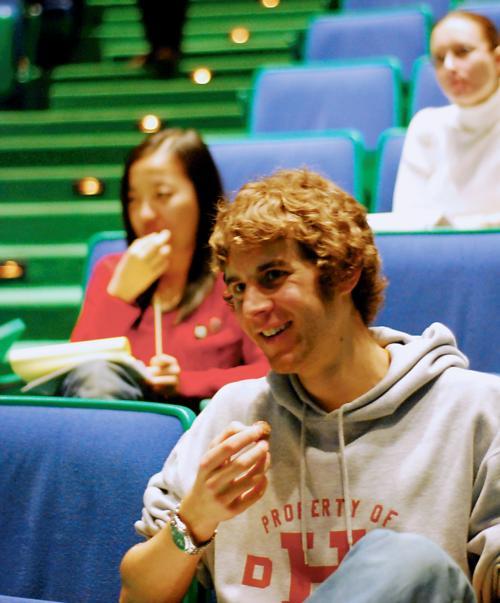
News
Summers Will Not Finish Semester of Teaching as Harvard Investigates Epstein Ties

News
Harvard College Students Report Favoring Divestment from Israel in HUA Survey

News
‘He Should Resign’: Harvard Undergrads Take Hard Line Against Summers Over Epstein Scandal

News
Harvard To Launch New Investigation Into Epstein’s Ties to Summers, Other University Affiliates

News
Harvard Students To Vote on Divestment From Israel in Inaugural HUA Election Survey
Larry and 'Lolita': The Crimson's Guide to Shopping Period
Former president, Russian writer, and chocolate among semester’s big attractions

Don’t have time to shop? Don’t worry. The Crimson does it for you.
From teleconferencing with the Medical School’s Longwood campus to tasting chocolate in class, this semester’s curricular offerings continue to provide undergraduates with the opportunity to pursue whatever strikes their fancy.
A CHANCE TO PLAY ‘HOUSE’
If you have a taste for medical diagnostics and participating in a new “electronic classroom,” then you don’t want to miss Molecular and Cellular Biology 234: “Cellular Metabolism and Human Disease,” being taught jointly by Professor Robert A. Lue and Medical School Professor Thomas Michel.
The class consists of Monday lectures and Wednesday class discussions of medical literature related to the metabolic pathway taught that week. These sessions will be taught in parallel in classrooms in Cambridge and on the Longwood campus, with video-conferencing apparatus connecting the two.
“It’s astonishing to me that this is the first time that a course has been offered in such a way,” Michel said.
On Fridays, the class will apply the week’s discussion on the specific metabolic pathway to real-life, bringing in a patient who is suffering from a disease related to that metabolic pathway. According to Michel, because of patient confidentiality issues, undergrads will have to travel to HMS for the Friday lectures.
‘LIGHT OF MY LIFE, FIRE OF MY LOINS’
If you’d rather read “Lolita,” and don’t mind doing it surrounded by reinforced concrete, then you may want to consider Mather’s house seminar on Russian writer Vladimir Nabokov, taught by Professor James R. Russell. The course—Mather 77: “Nabokov”—will focus on Nabokov’s life and work using his English-language autobiography and his major literary works.
“Nabokov is considered an enigmatic sort of stylist that puts some people off,” Russell said, “and these people tend to think of him as coldhearted.”
But Russell disagrees with this assessment. “It seems to me that what he was doing was simply being playful, and [his writing] has a deep emotional and moral meaning. He felt life was a game to be picked apart and enjoyed with delight, with many mysteries remaining.”
Russell feels that undergraduates in undergraduates in particular could benefit from studying the works of Nabokov in the intimate classroom setting of a house seminar.
“At every point in his life that I’ve read his novels, I’ve learned something new,” Russell said, “At the undergrad level, an introduction to Nabokov gives a student an emotional foundation, one that will stay throughout a person’s whole life.”
TASTING BY NUMBERS
If you’re more into turning a quantitative lens on everyday activities—and eating in class—then look no further than Statistics 105: “Real-Life Statistics: Your Chance for Happiness (or Misery),” taught by Xiao-Li Meng, the statistics department chair.
Through statistical principles and reasoning, the course hopes to help students analyze five “modules,” including online dating, and chocolate and wine tasting.
As a preview of the final module (and a surefire way to boost shopping period turnout), Meng held a chocolate tasting during the course’s first meeting yesterday.
“This course was designed in order to try to attract students to statistics,” Meng said. “We want students to appreciate how statistics works, and not necessarily to do things themselves, but to gain statistical insight into their own studies.”
A DIFFERENT KIND OF REGRESSION
If you want to spend the semester reading fairy tales in an attempt to recapture childhood idylls, try Literature and Arts A-17: “Childhood: Its History, Philosophy, and Literature,” taught by Germanic Languages and Literatures professor Maria Tatar.
“Studying childhood challenges us to think about how to provide opportunities—educational and environmental—for children,” Tatar wrote in an e-mail. “In studying what Lewis Carroll called ‘fabulous monsters,’ we also learn quite a lot about adults and how they have framed and contained childhood.”
Readings in Tatar’s class include everything from “The Little Mermaid” and “Goodnight Moon” to John Locke and, the ever-popular, “Lolita.”
“[The class] offers a chance to ‘go back,’ Tatar said, “and also to reflect on the educational challenges that face us in local and global terms.”
FORGET THE ‘DISCONTENTS’
And if you’d prefer a shot of current events with a heavy dose of academic star power, then check out Economics 1400: “The Contents of Globalization: Issues, Actors, and Decisions,” taught by former University President Lawrence H. Summers and Kennedy School professor Lant Pritchett.
According to its syllabus, the class will examine the social, political and economic issues raised by globalization through an economic lens.
The course intends to cover such topics as international trade, development assistance, international financial flows, global warming, immigration and labor mobility, and foreign investment.
—Staff writer Prateek Kumar can be reached at kumar@fas.harvard.edu.
Want to keep up with breaking news? Subscribe to our email newsletter.
